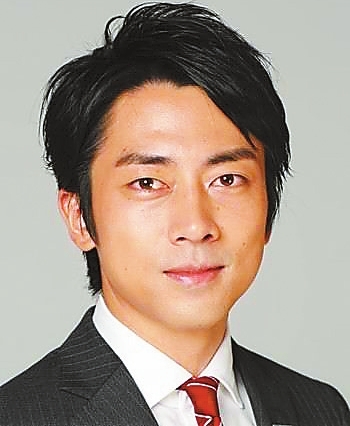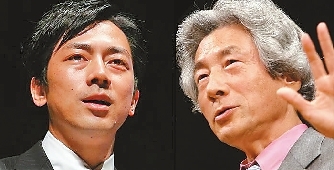

YOUNG and good-looking, Shinjiro Koizumi is called by media “Japan’s Macron.” The 38-year-old son of popular former Prime Minister Junichiro Koizumi has consistently led polls asking who should succeed long-serving Prime Minister Shinzo Abe. As the most prominent member of the ruling Liberal Democratic Party’s (LDP) new guard, he may be offered a post when Abe reshuffles his Cabinet next month in a bid to revive sagging public support. Abe wants to repair his popularity, battered by a scandal over suspected favoritism for a friend’s business and by many voters’ perception that he takes them for granted after more than four years in office. Shinjiro, as he is popularly known, to distinguish him from his father, has been suggested as a future leader since being elected in a 2009 lower house poll that temporarily ousted his Liberal Democratic Party. But Shinjiro has acknowledged the risks of taking on a high-profile post too soon. “People often say, ‘You’re young, so you shouldn’t fear failure,’” he told the Nikkei business daily in a rare interview in April. “But the ones who say that are waiting for you to fail. And if you fail, they will thoroughly beat you down.” Other young Japanese politicians have come to grief in prominent posts. Abe was queried about his youth when he embarked on his first stint as prime minister at age 52 in 2006. Abe resigned abruptly the following year, after a troubled tenure, but surged back to power in 2012. Some in the ruling party warn that Shinjiro’s accepting a key portfolio would have its downside, while perhaps not yielding Abe a big boost in popularity. “He’s still too young to be tasked with such heavy expectations,” LDP lawmaker Hajime Funada said. “It would be a difficult mission.” The closest Shinjiro has come to a Cabinet post was his 2014 appointment as parliamentary vice minister for reconstruction of tsunami-hit northeastern Japan. Shinjiro grew up in Yokosuka, his father’s home district, graduating Kanto Gakuin University in Yokohama with a bachelor’s degree in economics degree in 2004. When he was a student, he was engrossed in playing sports, especially baseball. Shinjiro speaks English fluently, which is rare in Japan’s political world. He earned a master’s degree in political science at Columbia University, and then worked at a Washington-based think tank. He later served as a secretary to his father before taking over a lower house seat left vacant by his father’s retirement in 2009 in the port city of Yokosuka, home to the U.S. Seventh Fleet. Even though the younger Koizumi has never held a Cabinet post and limits his media exposure, he is seen by many as the future of the ruling party due to his charisma, clean image and a resemblance to his father. The ex-prime minister enjoyed immense popularity during most of his five-year run in office and was known for his willingness to stir up the stodgy LDP. A recent poll by Jiji Press found Shinjiro was the most popular choice to succeed Abe, with 24.4 percent of respondents opting for him. In second place was former Defense Minister Shigeru Ishiba on 18.9 percent. Support for Shinjiro was especially high among women, at 32 percent, while 26 percent of male respondents selected him. A similar survey conducted in October 2018 showed Shinjiro topped the list with 28 percent. Rigorously tutored by his father, Shinjiro seldom speaks to the media, preferring to tour the countryside. Shinjiro shares some of Abe’s conservative views — he has paid his respects at Tokyo’s controversial Yasukuni shrine for war dead — but is hardly a protégé of the prime minister, having voted for a rival in a 2012 party leadership election. A fourth-generation lawmaker, Shinjiro has shaped an image as a reformer, while taking care not to offend party elders. “Shinjiro has a passion and instinctive feel for politics,” said a source who declined to be identified for privacy reasons. He has grabbed headlines for criticizing the farm lobby that has backed the LDP but blocked efforts to reform the sector. As head of a panel on redesigning social security to cope with Japan’s aging population, Shinjiro has suggested a “child insurance” scheme to fund free preschool education with premiums, an idea more palatable to fiscal hawks worried about a huge public debt than the alternative of more government bonds. He has been ambiguous on the politically touchy topic of nuclear power, however, seemingly caught between a government push to restart reactors and his father’s campaign, following the 2011 Fukushima disaster, to abandon atomic power. Shinjiro wants quick reforms to manage the country’s rapidly aging population, but said the country’s not ready for the scale of change he thinks it needs. “If you look at Japan now, people don’t want to change much,” Shinjiro said in a recent interview at his office in Tokyo. “They don’t have big dreams, but they don’t have a sense of crisis either,” he added. “But it’s no good for this country to stay as it is. What this country needs more than anything is change. Not just change, but rapid change.” Shinjiro heads an LDP panel on social security, which last month published a “vision” for reforms to tackle what Abe has called the national crisis of Japan’s demographics. The population is set to slump by almost a third by 2060, by which time about 40 percent of Japanese will be aged 65 or over, according to the National Institute of Population and Social Security Research. In a bid to rein in the ballooning debt fueled by the developed world’s fastest aging population, Abe’s government is set to raise the sales tax to 10 percent in October from the current 8 percent. Shinjiro declined to comment on whether he agreed with the plan, saying only: “It has been decided.” Rather than calling for higher taxes or lower payouts in its report, Shinjiro’s panel urged a re-evaluation of the concept of the working-age population. Older people should be encouraged to stay in the labor force beyond the traditional retirement ages of 60-65, becoming contributors to the social security system, rather than burdens on it, the report said. “We have to correct that huge imbalance between those who are supporting social security and those who are being supported by it,” Shinjiro said. Specific measures should include changing a tax system that gives precedence to housewives over working women, and offering health-maintenance incentives. “My field of vision has always been international, rather than domestic,” he said. “With the falling population, the domestic market is shrinking. When I was head of the party’s agriculture panel, I said Japan’s farmers shouldn’t look at the 100-million-strong internal market, but must sell to the 10-billion-strong global market.” The need to expand export markets was why he supported Japan joining the Trans-Pacific Partnership (TPP) regional trade deal at a time when it was anathema to many lawmakers in the LDP, which has strong ties to farming groups opposed to opening up agricultural markets. “We were a tiny minority in the party. Can you imagine how much we were criticized?” he said. “But we can’t make do just with our own shrinking market, we need to face up to the world.” After U.S. President Donald Trump pulled the United States out of the TPP soon after his inauguration, the 11 other members including Japan went ahead without the United States to forge a successor deal. Stephen Nagy, associate professor of Politics at Tokyo’s International Christian University, believes Shinjiro “is very young and relatively inexperienced,” so he is “going to have to play his cards very carefully” and bear in mind that “he has very large political shoes that he is going to have to step into” as “the economy is doing very well under Abe.” Nagy cited low unemployment and Abe’s well-received foreign policy. Shinjiro’s rivals to succeed Abe are now mostly in their 60s. And it may not be over for the prime minister, whose current term ends in September 2021. Some in his party have called for a change in the rules to allow him to run for a fourth consecutive term, though polls show voters oppose the idea.(SD-Agencies) | 
